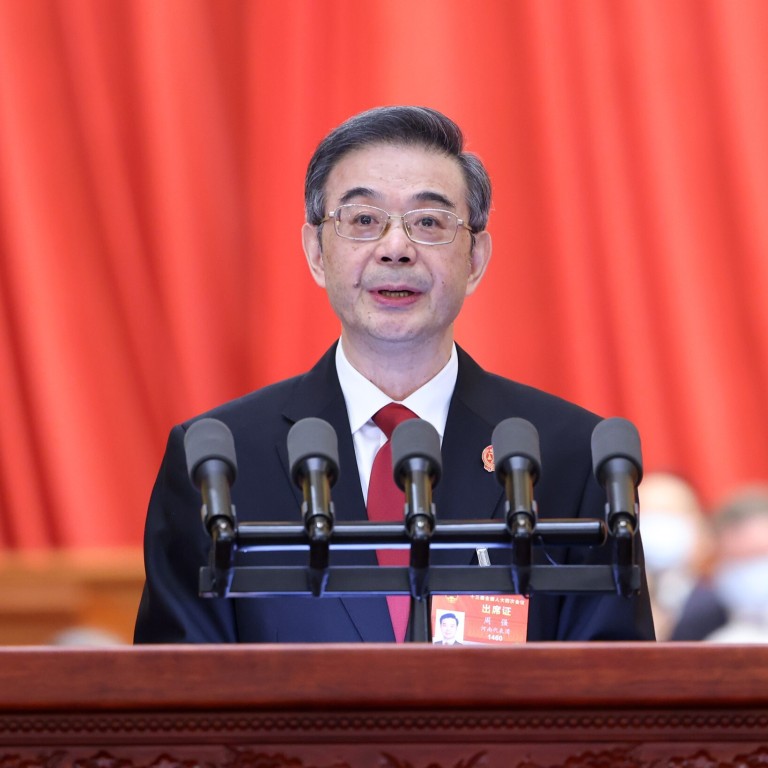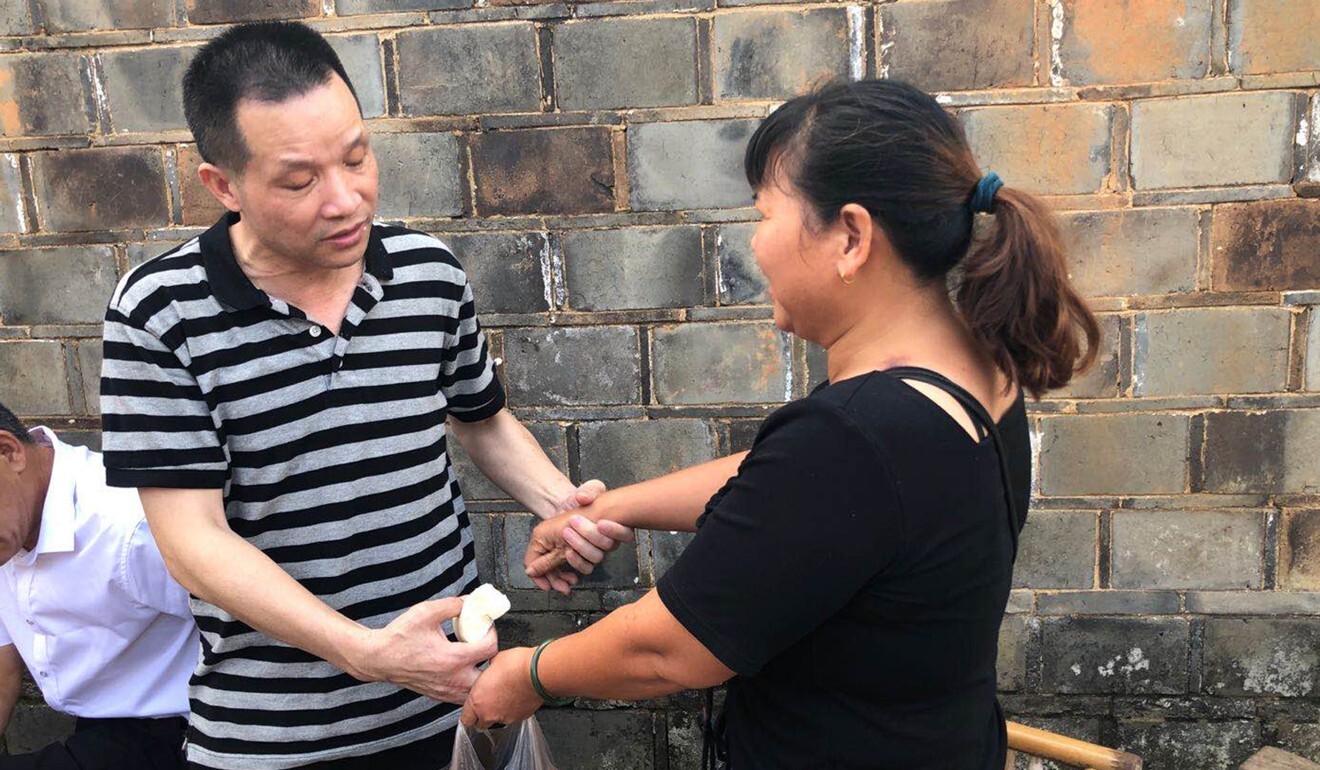
China makes strides in cutting violent crime, enforcing IP rights, National People’s Congress is told
- Top Chinese legal bodies also single out the problem of wrongful convictions in presenting their annual work reports to the legislature
- Observers question whether China’s courts can ever improve human rights protections
China’s top legal bodies have highlighted improvements in intellectual property rights and violent crime, even as observers question whether the country’s legal system can ever improve protection for human rights.
Two annual work reports, one by the Supreme People’s Court and the other by the Supreme People’s Protectorate, were presented to China’s legislature on Monday, revealing a raft of data on the performance of the legal system of the world’s most populous country. Serious violent crime hit a two-decade low in 2020, according to the Supreme People’s Protectorate report, which attributed the drop to the government’s successful campaign against gang crimes.
The US has long butted heads with China over intellectual property theft but 2020 showed signs of improvement, with a 39 per cent year-on-year increase in the number of foreign IP cases handled by Chinese courts. Prosecution of IP infringements increased 10 per cent, while compensation IP-related offences registered a 79 per cent increase, according to the Supreme People’s Court report.
Deng Yuwen, a former deputy editor of the Study Times, a Chinese Communist Party journal, said the party has to some extent helped China’s courts take more initiative in order to increase popular confidence in the country’s legal system and the party’s political legitimacy.

03:56
China’s 2021 National People’s Congress opens with Hong Kong’s electoral system on the agenda
“For anything unrelated to politics, China’s legal system has definitely realised a positive turnaround in terms of procedure, but it’s far from enough,” he said, adding that the party could still interfere in any case it deemed a challenge its rule.
Both work reports focused on general trends, but one specific case was mentioned. Last August, Zhang Yuhuan broke the record for the longest wrongful imprisonment in recorded Chinese history when he was released after almost 27 years in jail for a murder he did not commit.
Zhang’s case made national headlines, and Beijing is now looking to ensure no one else breaks this record, even as observers say this would require a fundamental change in the party-controlled legal system, where torture and corruption still lead to thousands of wrongful convictions every year.
China’s top judge, Zhou Qiang, author of the Supreme People’s Court work report, said wrongful convictions must continue to be overturned. Mentioning Zhang Yuhuan’s case by name, Zhou said that last year there were 1,040 wrongfully convicted people later declared to be innocent and 1,818 criminal cases that had their original sentences revised after retrial.
“Firm punishment and protecting human rights are all one of the same,” he said.
Zhang Yuhuan case shows China needs to address wrongful convictions
However, the brief mention of wrongful convictions in the lengthy report did not include an assessment of the root causes driving this phenomenon, according to observers.
Teng Biao, a human rights lawyer, said the number of wrongful convictions is several times higher than what the party divulges. The problem is driven by the fact that public prosecutors and public security bodies have the power to discipline judges who acquit defendants, causing China to have one of the highest conviction rates in the world, he said.
“Higher-ups in public security bodies or other government bodies will pressure underlings to solve a case, especially those involving loss of a life, before a certain date or face getting dismissed,” said Teng, who is currently a scholar at Hunter College in New York.
“Without a fundamental structural change in China’s legal system there is no way to improve the issue of wrongful convictions.”

Peter Dahlin, director of Asia-focused human rights NGO Safeguard Defenders, said that on its own, the numbers presented by Zhou Qiang would be impressive for a nation like Sweden or Spain, but not when compared to China’s 99.96 conviction rate for the 1.7 million verdicts handed in 2019.
“It’s been at this level ever since Xi Jinping came into power, actually increasing over the past few years,” he said, citing the Supreme Court’s own figures.
According to a forthcoming report by Safeguard Defenders, based on data from official Chinese sources, anyone arrested in China in 2019 had a 92 per cent chance of going to trial, which given the even higher chances of conviction at the courtroom means China’s legal system is a “railroad system”, according to Dahlin.
“This shows that legal defence, attorneys, legal counsel, have almost no role to play when it comes to affecting the outcome of the legal process,” he said.
“Once you’ve been arrested, that’s it, it’s over.”
Family of Chinese man cleared of murder exhausted by media glare
Last year, Zhang Yuhuan said he was tortured by public security officials to produce a confession that ultimately contributed to his original conviction. However, the Jiangxi High People’s Court rejected the application by Zhang and his lawyer to have such evidence disqualified, citing a lack of evidence behind the claims. New York-based Teng said forced confessions of this sort were still common in China.
Former party journal editor Deng agreed, but said that with CCTV footage, torture during interrogations had improved somewhat as victims now had a way to obtain proof, something Zhang in the 1990s was not privy to.
“The standards for discipline inside China’s judicial system are higher than before, and the general understanding and awareness of legal procedures has increased so cops cannot just torture indiscriminately,” he said.

The Supreme People’s Court abolished the use of conviction rates as a performance benchmark in 2014 in the hope that it would lead to fewer miscarriages of justice and reduce the instances of torture and forced confessions.
Dahlin said the party highlighted cases like Zhang’s every few years as a way of publicising improvements in China’s legal system. But he said this had no bearing on reality because physical and psychological torture was still rampant.
“There is no lawyer that we work with – and we are directly involved in a lot of legal defence cases – where one has ever, not even once, managed to remove evidence as a result of claims of torture,” he said.
Neither of the work reports presented to the National People’s Congress mentioned torture or forced confession.

